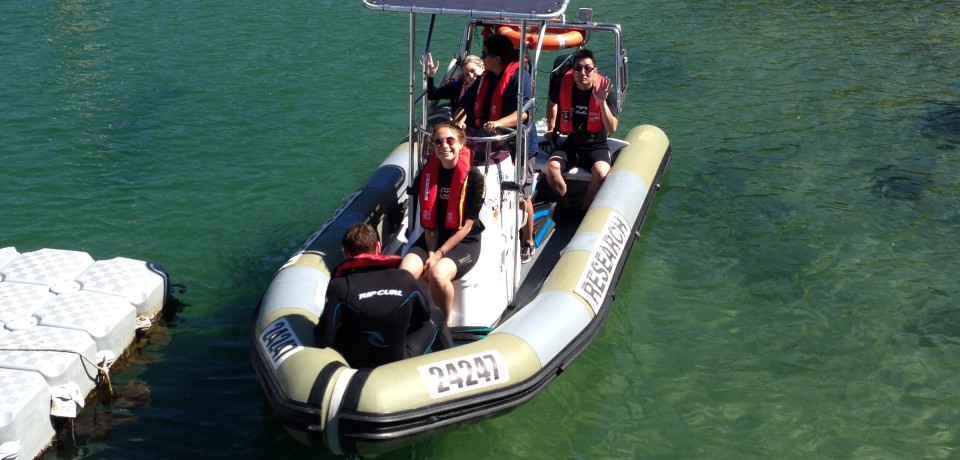Teaching
ENVS1018 – Environmental Management for a Changing World
This unit explores human interactions with the environment through the lens of sustainability and connectivity; concepts that are central to environmental management in our ever-changing world. It will help students to understand their environment from social and scientific viewpoints and will demonstrate how an interdisciplinary approach to environmental management is integral to human and ecosystem health. Current, real-world examples from terrestrial and marine ecosystems, social systems, atmospheric and climate systems, and their dynamic interplay encourage critical thinking about environmental management issues in Australia and globally.
ENVS3101 – Marine Climate, Wather and Coastal Oceanography
Our oceans regulate and drive climate change, whilst the coastal and shelf environments experience some of the greatest impacts of climate change. This unit provides students with a comprehensive understanding of these interactions and impacts on a range of scales (ocean basin to regional coast) and time scales (past millennia to future decades). The unit is taught in three modules: Module 1 – Marine Weather and Climate covers the tropics to the polar regions, with a focus on sea-surface temperature, precipitation, wind-fields, marine clouds, surface ocean currents, ocean wave generation, extreme maritime storms, synoptic climatology and large scale climate drivers. Module 2 – Coastal Oceanography covers continental shelf currents, coastal winds, wave transformation, sea-level variability, shoreface and surf zone processes, estuarine processes, storm surges, coastal flooding and sea-level rise. Module 3 – Marine Climate Change focuses on ‘How to Determine Past and Future Long-Term Changes in Marine Climate and Coastal Dynamics – Real World and Modelling Approaches’. The module covers seasonal, annual, decadal and centennial modes of ocean-atmosphere variability and predictability, evidence-based and modelling approaches to sea surface temperature, salinity and current change, sea-level change and ocean winds, wave climate change and coastal response.
GEOS3136 – Applied Marine Science
In this interdisciplinary capstone unit students consolidate their learning across the biology, earth and environmental science subjects and prepare themselves for appropriate transition to the next stage of their careers. This involves active reflection on prior learning, building and articulating a positive self-understanding, exploring opportunities, clarifying goals, acquiring adequate employability and workplace skills, and building linkages with professional communities and industries. A series of activities including guest speakers will facilitate students’ reflection on their studies and desires for their own career paths. The course also covers key topics such as communicating science, the publication and review process, research ethics, and career pathways.
ENVS7407/8407 – Field Methods in Environmental Science
This unit is run over the first two weeks of Session 3 and features an eight-day field trip to Jervis Bay on the New South Wales south coast. The unit focuses on coastal zone management issues, covering a mix of themes relevant to environmental science, such as: water quality, geomorphology, aquatic ecology, terrestrial ecology, coastal impacts, hazards and community attitudes. Students work in small groups to design a field data collection program, and learn different data collection and analysis methods. At the end of the field trip, each group presents their results, conclusions and recommendations to the class. Members of the local council and community are also invited to the presentations. For many students, this unit is the highlight of their Masters degree because of the opportunity to gain practical skills and knowledge, and build valuable collaborative networks with other students.
ENVS7418/8418 – Environmental Planning
This unit focuses on the issues influencing environmental planning and policy in Australia. It examines contemporary policy and practice affecting areas such as strategic land, biodiversity, water, mining and transport planning. There is a strong emphasis on the development and enhancement of critical analysis and constructive review of plans and policies and the development of practical skills used and required by professionals working in the field of environmental management and planning. The unit includes a field trip where students will learn and apply a range of techniques that are used to develop urban policies and plans.
This unit examines scientific and technical principles related to the management of sustainable cities. Major themes include city biodiversity and blue-green infrastructure (e.g. green walls and living seawalls), waste management (e.g. scientific innovation to support a circular economy and smart sensing technologies), air, land and water pollution (e.g. regulation and reduction through water sensitive urban design), and resource management (e.g. urban agriculture and vertical farming). The challenges for sustainable cities in a changing climate will be explored through each major theme. Different local, national and international case studies will be explored to demonstrate key concepts in the science and management of sustainable cities. The unit includes a field trip where students will apply their knowledge to enhance sustainability in an urban context.

